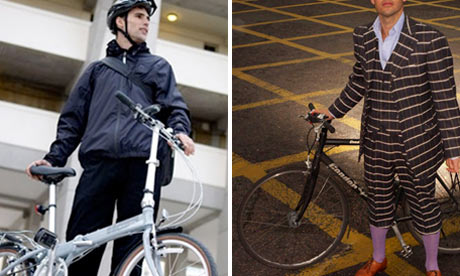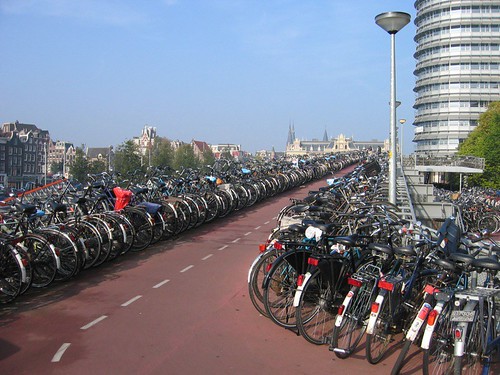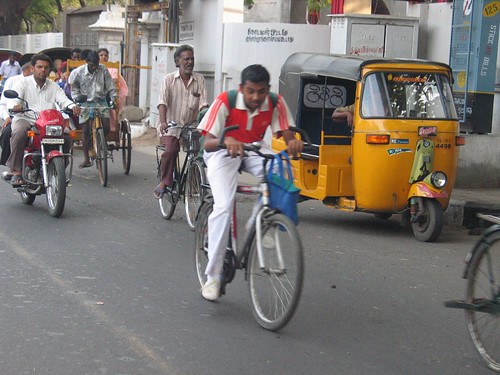(Source: Times Online, UK)
At last, specialist cycle clothing that does not make me look like I am wearing fancy dress

Two types of bicycle clothing: (left) Bspoke Holborn men's cycling jacket and (right) the cycle suit tailored by Russell Howarth from Dashing Tweeds. Photograph: PR (Image via Times Online, UK)
Cyclists world over had the problem with finding comfortable clothes that don’t make you look like an alien of a figure hugging ballerina and now the good folks at Transport for London have finally decided to take matters into their own hands. An article by Peter Robins, that appeard on the TIMES UK-Ethical Living blog discussed this new solution offered by the Brits. Here I present you some key sections of this wonderful article:
“Boris Johnson has made me a jacket. Or possibly it was Ken Livingstone. Whichever it was, they also made me some trousers, and one of those half-zipped semi-cardigan whatsits – I have yet to actually try those. Truly, if you want to understand the politics, in several senses, of what to wear on a bicycle these days, there are few better starting points than the Bspoke clothing range.
The Bspoke range, supported and to some extent pushed into existence by Transport for London, is designed to look like normal clothing while behaving like specialist cycle clothing. That’s not a need you might normally expect to concern a branch of the government, but it is a real need.
Cycling is not kind to normal clothes. Chains and saddles can do very bad things to trousers – wheels, I’m told, can do even worse things to skirts – and pedals have a way of hammering soles. Although a standard-paced pootle is not nearly as strenuous as non-cyclists might think, a hot day or a dash to an appointment can quickly fill a shirt with sweat. While you may need rain protection, you also need peripheral vision, so anything with a hood becomes an encumbrance.
On the other hand, cycling clothes are not kind to normal humans. All that close fitting – even if you avoid Lycra – and all those violent high-visibility colours will make you look, at best, like a Star Trek version of a building contractor. The cuts, in many cases, only seem entirely natural when you are hunched and pumping. Pockets, where they occur at all, are in weird places and either constricted or sack-like. What’s more, conspicuous cycle clothes turn you into an unambiguous, single-purposed cyclist, impossible for a passer-by or an irritated lorry driver to picture in any more sympathetic context.
All that could be tolerable for sport or leisure biking somewhere quiet, but not so much on a city street, and not if you’re going into an office – in the case of some designs, not even if you’re walking through an office to find somewhere to change. Not, in other words, if you want to incorporate a bike into your life as a regular mode of transport. And that is the point at which it becomes clear why TfL should have become interested in making jackets.
TfL, of course, is not the only organisation trying to liberate cyclists from Lycra; it has become quite a fashionable exercise. Many of the best publicised efforts, however –Dashing Tweeds’ designs, the Tweed Run, Rapha’s bewildering £3,500 men’s bicycle suit – draw on cycling’s turn-of-last-century heritage to self-consciously spectacular effect. They reject a 1960s sci-fi costume for a steampunk one. Dressing up as an Edwardian ninja, or for that matter as a bicycle messenger, does not strike me as being profoundly different from dressing up as part of the peloton. True, the clothes are not so repulsively unflattering, but it still feels like fancy dress. I don’t want to be in fancy dress.
Click here to read the entire article. Oh, and don’t forget to register your comments after reading.
TransportGooru Musings: My exploration into the TfL website for information on Bspoke found the following: “bspoke is a versatile clothing collection that performs within an urban environment and yet has a timeless fashion for day/work wear. Supported by Transport for London’s bike to work programme the bspoke team has designed two separate year round collections for men and women. Clothes combine performance fabrics with innovative detailing to make sure your daily commute is a safe and comfortable one. However it is the attention to contemporary styling and silhouettes’ that makes bspoke unique amongst other leisure or sporting specific clothing.”
Hmm..Though I am not sure whether our American parliamentarians (rather Congressmen – for those who don’t know what the term Parliament means) would give some money to the USDOT for designing some sleek clothing for bikers in the upcoming transportation reauthorization bill, I am positive that some of them avid bikers (like Rep. Oberstar & Rep. Bleumenauer) wouldn’t mind sporting such a sleek clothing line while biking around the US Capitol Building, sending a strong(but expensive) message promoting bicycling. Now, that would be worth spending!






 These were the two chief issues discussed during a public meeting at the Carter Road amphitheatre, Bandra (W), to popularise cycling in the city to check pollution and reduce traffic congestion. The meeting, which generated a buzz in the vicinity, had several passersby joining in. Also among the participants were young professionals working in the IT industry and call centres.
These were the two chief issues discussed during a public meeting at the Carter Road amphitheatre, Bandra (W), to popularise cycling in the city to check pollution and reduce traffic congestion. The meeting, which generated a buzz in the vicinity, had several passersby joining in. Also among the participants were young professionals working in the IT industry and call centres.